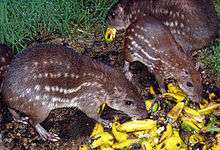Definify.com
Webster 1913 Edition
paca
pa′ca
(Pg. pä′kȧ; E. pā′kȧ)
, Noun.
[Pg., from the native name.]
1.
(Zool.)
A large burrowing South American rodent (
Agouti paca
syn. Cuniculus paca
, formerly Cœlogenys paca
), having blackish brown fur, with four parallel rows of white spots along its sides; the spotted cavy. It is closely allied to the agouti and the Guinea pig and is highly esteemed as food. Webster 1828 Edition
Paca
PACA
,Noun.
Definition 2026
paca
paca
English

Cuniculus paca
Noun
paca (plural pacas)
- Any of the large rodents of the genus Cuniculus (but see also Cuniculus#Synonyms), native to Central America and South America, which have dark brown or black fur, a white or yellowish underbelly and rows of white spots along the sides.
Derived terms
- lowland paca (Cuniculus paca)
- mountain paca (Cuniculus taczanowskii)
Translations
rodent of genus Cuniculus
|
See also
- Cuniculus hernandezi
-
 paca on Wikipedia.Wikipedia
paca on Wikipedia.Wikipedia
Anagrams
Classical Nahuatl
Pronunciation
- IPA(key): /paːka/
Verb
pāca
- (transitive) to wash
References
- Andrews, J. Richard (2003) Workbook for Introduction to Classical Nahuatl, revised edition edition, Norman: University of Oklahoma Press, page 244
- Campbell, R. Joe (1997), “Florentine Codex Vocabulary”, in (Please provide the title of the work)
- Karttunen, Francis (1983) An Analytical Dictionary of Nahuatl, Austin: University of Texas Press, page 182
- Lockhart, James (2001) Nahuatl as Written: Lessons in Older Written Nahuatl, with Copious Examples and Texts, Stanford: Stanford University Press, page 228
Esperanto
Adjective
paca (accusative singular pacan, plural pacaj, accusative plural pacajn)
Derived terms
Hungarian
Pronunciation
- IPA(key): [ˈpɒt͡sɒ]
- Hyphenation: pa‧ca
Noun
paca (plural pacák)
- (colloquial) inkspot
Declension
| Inflection (stem in long/high vowel, back harmony) | ||
|---|---|---|
| singular | plural | |
| nominative | paca | pacák |
| accusative | pacát | pacákat |
| dative | pacának | pacáknak |
| instrumental | pacával | pacákkal |
| causal-final | pacáért | pacákért |
| translative | pacává | pacákká |
| terminative | pacáig | pacákig |
| essive-formal | pacaként | pacákként |
| essive-modal | — | — |
| inessive | pacában | pacákban |
| superessive | pacán | pacákon |
| adessive | pacánál | pacáknál |
| illative | pacába | pacákba |
| sublative | pacára | pacákra |
| allative | pacához | pacákhoz |
| elative | pacából | pacákból |
| delative | pacáról | pacákról |
| ablative | pacától | pacáktól |
| Possessive forms of paca | ||
|---|---|---|
| possessor | single possession | multiple possessions |
| 1st person sing. | pacám | pacáim |
| 2nd person sing. | pacád | pacáid |
| 3rd person sing. | pacája | pacái |
| 1st person plural | pacánk | pacáink |
| 2nd person plural | pacátok | pacáitok |
| 3rd person plural | pacájuk | pacáik |
Synonyms
- tintafolt
- tintapaca
Derived terms
- pacáz
- tintapaca
Irish
Alternative forms
- puca (Cois Fharraige)
Etymology
From Middle English pakke, from Proto-Germanic *pakkô (“bundle, pack”).
Pronunciation
- IPA(key): /ˈpˠakə/
Noun
paca m (genitive singular paca, nominative plural pacaí)
- pack (bundle to be carried)
Declension
Declension of paca
Mutation
| Irish mutation | ||
|---|---|---|
| Radical | Lenition | Eclipsis |
| paca | phaca | bpaca |
| Note: Some of these forms may be hypothetical. Not every possible mutated form of every word actually occurs. | ||
Italian
Etymology 1
Via Spanish, from Guaraní paka.
Noun
paca m (invariable)
Etymology 2
From pacare.
Verb
paca
Anagrams
Spanish
Etymology
From Old French pacque
Noun
paca f (plural pacas, masculine paco)
- bale
- (chiefly Argentina, Paraguay and Uruguay) paca
- (colloquial, pejorative, Latin America) female police officer
Synonyms
- (rodent):
- boruga f (Colombian Amazonia)
- conejo pintado m (Panama)
- guagua f (Colombia)
- guanta m (Ecuador)
- guartinaja m (Northwestern Colombia)
- jochi pintado m (Bolivia)
- lapa f (Venezuela, Colombian Llanos)
- majaz m (Peru)
- tepezcuintle m or tepezcuinte m (Mexico, Central America)
- tinajo m (Northeastern Colombia)